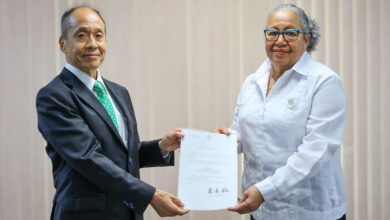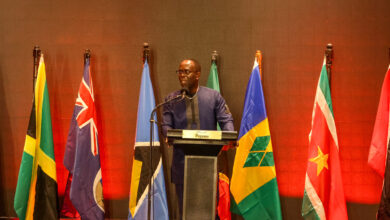Today’s children will be tomorrow’s leaders. How often we hear these words or repeat them ourselves. This year, World Aids Day is being observed under the theme “Children Living in a World with AIDS”. As we grapple with the myriad social and economic problems confronting our region and their effects on the most vulnerable groups, let us reflect on the reality of HIV/AIDS and its effect on our children.
What type of world are we preparing to pass on to our children? How many of our children will enjoy their childhood free of illnesses and diseases, how many will make it to a healthy adulthood? Our Region which has justifiably boasted about the significant progress in the elimination and control of many communicable diseases now stands threatened by this new scourge which has the potential of reversing previous health status gains.
Between 1982, when the first AIDS case was diagnosed in the Caribbean Region , and end 1996, 10,659 cases of AIDS have been reported to the Caribbean Epidemiology Center (CAREC), of which 687 were children under 15 years of age.
HIV may be acquired before, during or after birth, or in later years through unsafe sexual practices or other risky behaviour such as the transfusion of infected blood and the use of contaminated needles. The impact of HIV/AIDS is felt within families and communities when relatives and friends succumb to the disease. It is particularly distressing when children lose a parent and are forced out into the world to fend for themselves, or to burden older family members or already overcrowded public child care facilities.
It is very worrying that the trend in the Caribbean continues to be one of increasing infection rates with greater involvement of the adolescent and young adults.
The implications of this trend are far reaching:
– the reduction in the number of young persons during the most productive years of their lives and the consequential negative impact on our economic development;
– a high case-fatality rate in the absence of effective treatment for HIV/AIDS will consequently ensure that the disease becomes the most important cause of premature deaths among young adults in the future;
– large cohorts of young women with many more potential years of childbearing, who become infected will contribute to a rapid expansion of the number of pediatric AIDS cases, with their attendant social, medical and financial implications.
As a Region, it is very important that we place HIV/AIDS high on all our agendas: political, social and economic. We need to take a multi-sectoral approach as we develop comprehensive programmes with strategies to encourage a change in our sexual lifestyles. If the HIV/AIDS epidemic is not checked, there will be serious negative consequences for the social and economic well being of the Caribbean people and more particularly the future of our children will be grim.





